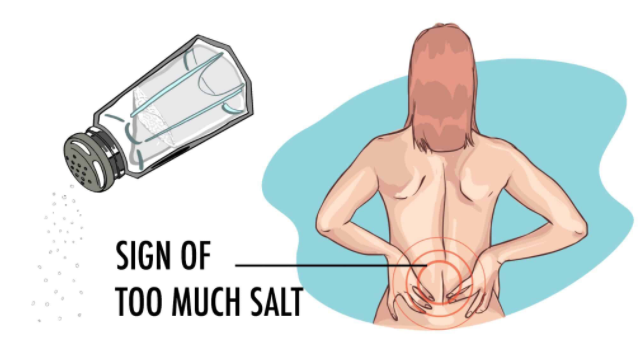Salt as a spice, we all use daily in our kitchen in almost every meal. As with everything else, the rule of moderation applies to salt. The table salt we use contains 40 percent sodium and 60 percent chloride, which means that each teaspoon of salt contains 2,000 milligrams of sodium, which is about a little more than a tablespoon of salt. However, the average salt intake in most people is twice the recommended dose. Excessive salt intake can lead to long-term health consequences. Excess salt can cause hypernatremia and a number of other health problems. Therefore, we need to pay attention to the signals that your body sends to you to inform you that you are consuming too much salt.
Swelling
Swelling is a clear indication that your body has too much salt. Swelling most often occurs on the feet, so you will surely notice that the shoes you often wear slowly become tight. You may notice rings from the socks on the ankles or visible swelling of the feet. You may also notice swelling on your face in the morning when you wake up. These are all signs of excessive salt intake, so the feeling of bloating will be inevitable. These swellings are unpleasant in any case, they cause the blood volume to increase and cause the heart to work harder in order to perform its function properly. Thus your body begins to retain larger amounts of water due to the excessive amount of salt and consequently swelling occurs. This disorder is called edema and is treated with a strict diet.
Discoloration of urine
How does urine change color? The reason for this is the excessive amount of sodium in the body, so it contributes to serious changes in the urine. How does too much sodium affect the body? Excessive salt intake causes the kidneys to work harder and harder than usual to expel salt from the body. This can be a cause of kidney disease, and as a result you will have a more frequent need to go to the toilet and your urine will be transparent. On the other hand, too much sodium in the body can lead to dehydration. When there is a significant loss of body fluids, your amount of urine decreases and as a result the urine becomes dark yellow in color.
Muscle cramps
Why is it important to maintain a balance of sodium and potassium intake? Maintaining a balance of sodium and potassium intake is extremely important for your health. These chemical elements are responsible for muscle contractions. Excessive intake of salt and salty foods disturbs that balance, resulting in muscle cramps and pain.
Thirst
How Does Sodium Salt Affect Your Body Functions? The sodium contained in salt helps balance the fluids contained in your body. When you have too much salt in your body, your body needs more fluid to flush excess salt out of the system, and so your muscles and organs can function properly. So your body needs a balance between water and sodium, and drinking water can be a great way to achieve that balance. Your body needs a certain amount of water, after the intake of salty foods or salt, to be able to achieve the required balance. Getting enough water on a daily basis is very important, because if you do not get enough water, your body begins to use the fluids that are in your cells, and thus can lead to dehydration.
High blood pressure
When you ingest too much salt in your body, your body sends a message to the kidneys that it needs more fluid to function normally, which leads to more fluid retention in the body. Accordingly, excess fluid raises blood pressure and strains the arteries, heart, brain, and kidneys. Thus, the kidneys, receiving the message, start working harder and harder, the small muscles in the arteries weaken and thicken, which leads to an increase in blood pressure. High blood pressure caused by excess salt can damage the arteries that lead to your brain. Because everything in our body is connected in some way, excess salt can lead to impaired thinking ability of the brain and the like. In addition, dehydration can cause memory problems, fatigue and slow reactions.
Bone pain
Intake of excessive amounts of salt in the body, as mentioned earlier, affects the kidneys, but also affects the bones in your body. How? When you consume too much salt, the kidneys can not be completely cleansed, leading to a loss of calcium. Lack of calcium in the body leads to bone weakness, dental problems and even osteoporosis.
Persistent headaches
Excessive salt intake in your body leads to excess sodium, and excess sodium directly affects the increase in the volume of blood in your body, so that that blood takes up more space in the blood vessels. This in turn leads to dilation of blood vessels which in turn cause high blood pressure and therefore headaches are a logical sequence of events.

